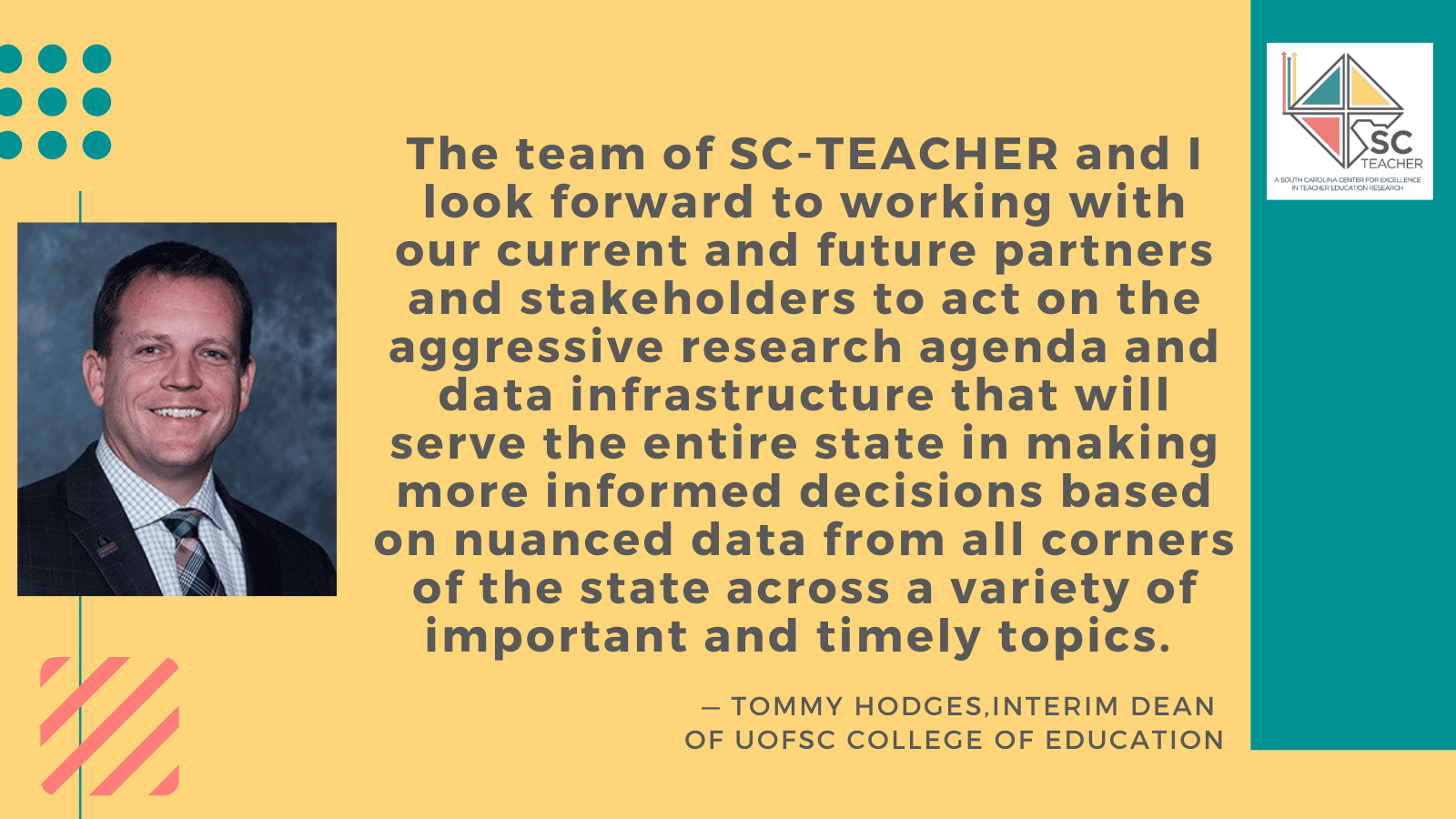Since 2018, SC-TEACHER has published working papers, fact sheets, infographics, annotated bibliographies, blogs, and first-person educator stories. SC-TEACHER has also crafted presentations for legislative members and staff and provided meaningful data insights to key education policy decision-makers. About eight months ago, I shared my thoughts on Setting the Vision for SC-TEACHER. As exciting as it may be to look back at our growing list of accomplishments since its launch, I hold even more enthusiasm for its future.
My optimism rests on the Center’s unique partnerships among state education agencies, higher education institutions, school districts, and national organizations.
My optimism rests on the Center’s unique partnerships among state education agencies, higher education institutions, school districts, and national organizations. Authentic partnerships take time to build requisite trust and require significant negotiation of priorities. Once established, these partnerships have not only led to a more coordinated effort around data sharing but also generated a “think tank” to address burning questions and a marshalling of expertise in K-12 and higher education to tackle these questions.
Against the backdrop of these partnerships and with significant data housing, security, analytic, and psychometric expertise, SC-TEACHER is poised to fill the gap for South Carolina’s education policy and practice initiatives. Below are a few of the ways in which SC-TEACHER is positioned and prepared to serve the state:
- Provide a research hub for campuses that focus on educator preparation. Educator preparation programs can be siloed, and promising practices often do not serve to elevate the collective. “In a true profession, the wisdom of the profession’s members finds its way into the most common methods” (Stigler & Hiebert, 1999, p. 179). By engaging faculty across educator preparation institutions and researching the practice of educator preparation, SC-TEACHER serves as the state’s hub for improving the practice of educator preparation, fueling greater collaboration among institutions in addressing supply and demand of teachers and school leaders – generating both outcomes and cost efficiencies.
- Engage practitioners working alongside researchers to improve education systems. No one is better positioned to articulate the needs of schools and districts than those who are charged with leading and working within it. A key component of retaining education professionals includes combining practitioner expertise with research and policy expertise for a comprehensive view of funding, policies and statutes, and empirical evidence, alongside practical implications of potential changes. In partnership with the Carnegie Corporation of New York and three South Carolina districts, SC-TEACHER is already making progress on this work:
- Documenting teacher and school leader innovations and how they can be aligned to support deeper, more equitable opportunities and outcomes for students;
- Assessing the human capital assets and needs of school communities to support whole child education; and
- Building a framework for a coherent system of educator development to inform legislative action, including compensation.
- Provide technical support and assistance to elevate collective practices. In addition to the South Carolina Teacher Exit Survey developed by SC-TEACHER in conjunction with district partners, South Carolina has an acute need for a teacher working conditions instrument designed by and for South Carolina. Teachers who work in schools with strong professional environments improve their effectiveness, over time, significantly more than their counterparts. Today, we know much more about the key factors of working conditions that influence teacher retention and student achievement. SC-TEACHER is well-positioned to both expand the Teacher Exit Survey, as well as build and deploy a South Carolina teacher working conditions initiative. It is one thing to gather and report on data and quite another to provide the technical assistance to districts and schools to use those data to engage and improve the professional lives of all educators serving students and communities. Engaging the full complement of partners allows for the development of toolkits alongside professional learning engagements to support districts in strategically using data in meaningful and specific ways. There is also significant value in universal graduate and employer satisfaction surveys used by all educator preparation programs in support of national accreditation and programmatic improvement. SC-TEACHER is well-positioned to provide this needed network for educator preparation.
- Provide evidence in support of the Commission on Higher Education Centers of Excellence Grant Program. The critically needed grants program led by CHE to support education quality through innovative professional development engagements has already benefitted from SC-TEACHER data. The FY22 priorities for funding included leadership/principalship preparation, STEM and literacy education, and retention in Lowcountry and Pee Dee regions – all of which were derived from SC-TEACHER reports. Allocating funding toward empirically-based evidence represents the surgical approach need to make the best use of available state and local funds.
The University is pleased to have the support for SC-TEACHER reflected in Gov. McMaster’s budget. The team of SC-TEACHER and I look forward to working with our current and future partners and stakeholders to act on the aggressive research agenda and data infrastructure that will serve the entire state in making more informed decisions based on nuanced data from all corners of the state across a variety of important and timely topics. Without a doubt, those concerned about the education of South Carolina’s children recognize the need for significant transformation. The children, families, and communities deserve decisions that are grounded in a cohesive data system designed to advance the educator workforce – now, more than ever.


